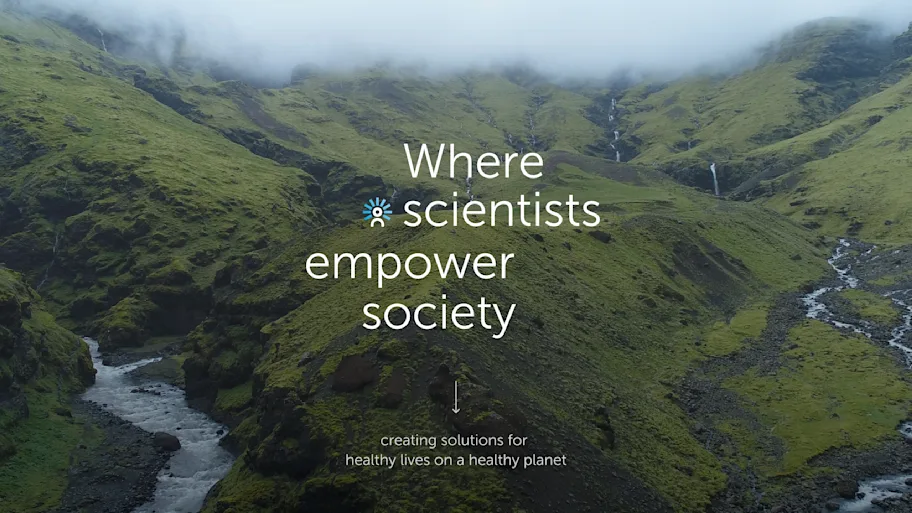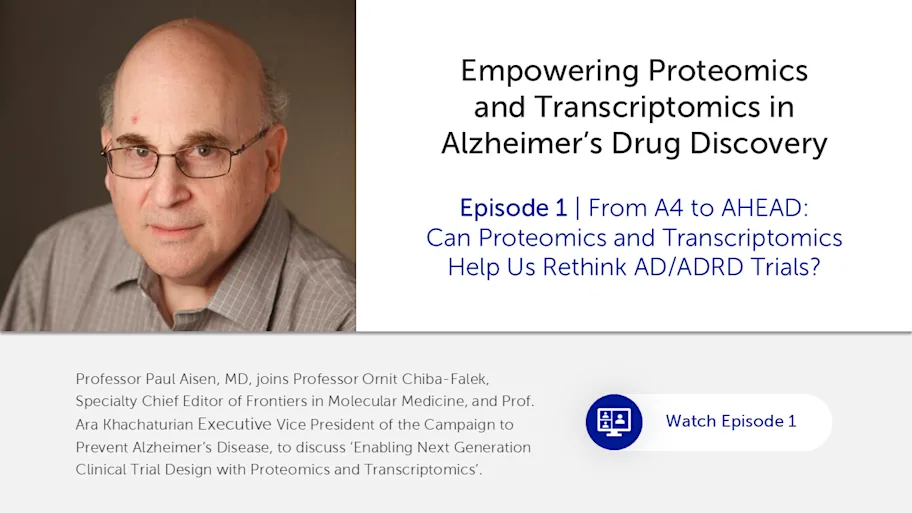
- Science news
- Frontiers news
- Frontiers supports Alzheimer's research with expert-led interview series focused on open data and drug discovery
Frontiers supports Alzheimer's research with expert-led interview series focused on open data and drug discovery
A new interview series highlighting open data, collaboration, and leading-edge research in the fight against Alzheimer’s disease launched with the support of Frontiers

Frontiers today announces the launch of a new interview series ‘Empowering proteomics and transcriptomics in Alzheimer’s drug discovery’, in collaboration with the Brain Watch Coalition, the Campaign to Prevent Alzheimer’s Disease, and the International Neurodegenerative Disorders Research Center. The series is hosted by Dr Ornit Chiba-Falek, Specialty Chief Editor of Frontiers in Molecular Medicine and Division Chief of Translational Brain Sciences in the Department of Neurology at Duke University, and Dr Ara Khachaturian, Executive Vice President of the Campaign to Prevent Alzheimer’s Disease.
The series brings voices across the research community to reimagine the importance of open data in accelerating the discovery of early detection tools and treatments for Alzheimer's Disease and Alzheimer's Disease Related Dementias (AD/ADRD). In line with Frontiers’ mission of making science open, the series demonstrates that roadblocks in the data pipeline of Alzheimer’s research can be overcome through open and accessible data and extensive collaborations between academia, industry players, research funders, policymakers, and patients and their families.
First episode: ‘From A4 to AHEAD – can proteomics and transcriptomics help us rethink AD/ADRD trials?’
The premiere interview features Dr Paul Aisen, Founding Director of the Alzheimer’s Therapeutic Research Institute (ATRI) at the University of Southern California. Dr Aisen discusses how global access to rich datasets from next-generation molecular clinical trials like Anti-Amyloid Treatment in Asymptomatic Alzheimer’s (A4) and AHEAD is catalyzing progress in early detection, data-driven biomarkers, and innovative therapies.
Consisting of a vast amount of clinical, cognitive, imaging, and genetic data, the open data enables researchers worldwide to develop and validate blood-based biomarkers for earlier detection, offering new hope for preventive therapies and precision medicine. Dr Aisen emphasizes that the success of future Alzheimer’s therapies will depend on the sharing of these high-dimensional trial data and close multidisciplinary collaboration.
Dr Paul Aisen, Founding Director, ATRI, shared:
“It is a huge effort to do big definitive trials in Alzheimer’s disease. We need to take advantage of everything that we learn and the way to do that is by sharing and collaborating. The more that we share our ideas, and preferably all of our data, software, images, and materials, and work together, the faster we are going to make progress.”
Empowering the research community
As precision medicine holds immense promise for revolutionizing the treatment and prevention of neurodegenerative diseases, including AD/ADRD, the Research Topic ‘Empowering precision medicine in neurodegenerative diseases via data sharing strategies and AI innovations’ is calling for submissions. A recent webinar, titled Empowering Proteomics and Transcriptomics in Alzheimer’s Drug Discovery, showcasing the latest developments in data standardization, open access, and the impact of proteomics and transcriptomics in clinical trials sparked valuable dialogue across the field. Building on that momentum, this new interview series has been launched to keep the conversation going and delve deeper into the key themes explored during the event.
Dr Ornit Chiba-Falek, Specialty Chief Editor of Frontiers in Molecular Medicine and Division Chief of Translational Brain Sciences in the Department of Neurology at Duke University, said:
“Translational neuro-omics through the integration of transcriptomics and proteomics datasets is where biology meets precision, and where innovative biomarkers can unlock the next breakthrough towards personalized medicine in Alzheimer’s disease.”
Dr Ara Khachaturian, Executive Vice President, Campaign to Prevent Alzheimer's Disease, added:
“This series is here to surface the pain points, highlight solutions, and hopefully spark a few moments of ‘what if we tried new paradigm in Alzheimer’s drug discovery and biomarkers development?’”
Dr Frederick Fenter, Chief Executive Editor, Frontiers, commented:
“As a leading gold open access publisher, Frontiers is committed to ensuring data and research are accessible to as many users as possible worldwide. With the launch of this series, we hope to highlight the critical importance of open data in speeding up scientific advancement – not just to the research community, but for society as a whole.”
About Frontiers
Frontiers is a leading research publisher. Our role is to provide the world’s scientists with a rigorous and efficient publishing experience. Scientists empower society and our mission is to accelerate collaboration and discovery by making science open – enabling researchers to find the solutions we all need for healthy lives on a healthy planet. Powered by custom-built technology, artificial intelligence, and a collaborative peer review, our community journals give experts in more than 1,800 academic fields an open access platform to publish high quality, high impact research. Through our outreach work to build strong partnerships with business, policymakers, and educators, we’re leading the transition to open science.





